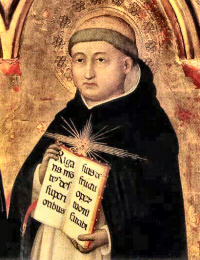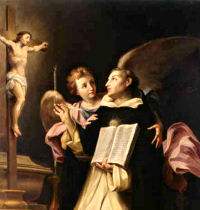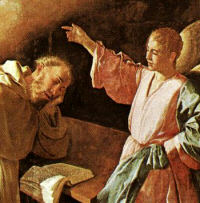
Daily Readings for:January 28, 2014
(Readings on USCCB website)
Collect: O God, who made Saint Thomas Aquinas outstanding in his zeal for holiness and his study of sacred doctrine, grant us, we pray, that we may understand what he taught and imitate what he accomplished. Through our Lord Jesus Christ, your Son, who lives and reigns with you in the unity of the Holy Spirit, one God, for ever and ever.
RECIPES
o Cappelletti all'uso di Romagna
o Polenta
ACTIVITIES
o Hymn: Adoro Te Devote - Hidden God
o Hymn: Sacris Solemniis - At This Our Solemn Feast
o Hymn: Tantum Ergo - Down in Adoration Falling
o Hymn: Verbum Supernum - The Word of God
o Nameday Celebration Prayers and Ideas for Saint Thomas
o Practical Suggestions for Christian Living (Matrimony)
PRAYERS
o Prayer to St. Thomas Aquinas for Schools
o Prayer to the Angel of Schools
o Litany of St. Thomas Aquinas
LIBRARY
o Saint Thomas Aquinas (2) | Pope Benedict XVI
o Saint Thomas Aquinas (3) | Pope Benedict XVI
o Saint Thomas Aquinas | Pope Benedict XVI
o Studiorum Ducem (On St. Thomas Aquinas) | Pope Pius XI
o The Meaning of Virtue in St. Thomas Aquinas | Fr. John A. Hardon S.J.
o The Philosophy of Woman of St. Thomas Aquinas | Kristin M. Popik
o The Teaching of St. Thomas Aquinas in Regard To the Apostles | Nicholas Halligan O.P.
o Thomas Aquinas: a Doctor for the Ages | Romanus Cessario
o Thomas Aquinas: the Angelic Doctor | Sal Ciresi
· Ordinary Time: January 28th
· Memorial of St. Thomas Aquinas, priest and doctor
Old Calendar: St. Peter Nolasco, confessor
St. Thomas Aquinas is the Dominican order's greatest glory. He taught philosophy and theology with such genius that he is considered one of the leading Christian thinkers. His innocence, on a par with his genius, earned for him the title of "Angelic Doctor".
According to the 1962 Missal of Bl. John XXIII the Extraordinary Form of the Roman Rite, St. Thomas' feast was celebrated on March 7.
Today is the feast of St. Peter Nolasco, who was born in southern France. After the death of his wealthy parents, he spent his inheritance in Barcelona to rescue Christians enslaved by the Moors. He formed a lay confraternity, which later developed into the religious order of the Mercedarians, and led his fellow workers into Moorish territory to purchase the freedom of Christian captives, and to make numerous conversions among the non-Christians. Later Peter's Mercedarians labored among the Indians of the far-flung Spanish American Empire.
St. Thomas Aquinas
St. Thomas ranks among the greatest writers and theologians of all time. His most important work, the Summa Theologiae, an explanation and summary of the entire body of Catholic teaching, has been standard for centuries, even to our own day. At the Council of Trent it was consulted after the Bible.
To a deeply speculative mind, he joined a remarkable life of prayer, a precious memento of which has been left to us in the Office of Corpus Christi. Reputed as great already in life, he nevertheless remained modest, a perfect model of childlike simplicity and goodness. He was mild in word and kind in deed. He believed everyone was as innocent as he himself was. When someone sinned through weakness, Thomas bemoaned the sin as if it were his own. The goodness of his heart shone in his face, no one could look upon him and remain disconsolate. How he suffered with the poor and the needy was most inspiring. Whatever clothing or other items he could give away, he gladly did. He kept nothing superfluous in his efforts to alleviate the needs of others.
After he died his lifelong companion and confessor testified, "I have always known him to be as innocent as a five-year-old child. Never did a carnal temptation soil his soul, never did he consent to a mortal sin." He cherished a most tender devotion to St. Agnes, constantly carrying relics of this virgin martyr on his person. He died in 1274, at the age of fifty, in the abbey of Fossa Nuova. He is the patron saint of schools and of sacred theology.
— Excerpted from The Church's Year of Grace, Pius Parsch
Patron: Academics; against storms; against lightning; apologists; book sellers; Catholic academies; Catholic schools; Catholic universities; chastity; colleges; learning; lightning; pencil makers; philosophers; publishers; scholars; schools; storms; students; theologians; universities; University of Vigo.
Symbols: Chalice; monstrance; ox; star; sun; teacher with pagan philosophers at his feet; teaching.
Things to do:
- Read G.K. Chesterton's biography, St. Thomas Aquinas, The Dumb Ox, which is full of Chestertonian profundity and wit online or purchase it from Amazon.
- Dive into the intellectual depth and beauty of St. Thomas' thought in his Summa Theologiae. Familiarize yourself with his method of inquiry by reading his section on God's attributes, especially the goodness of God. Here is a Bibliography in English.
- Nearly everyone, especially young people, knows and appreciates the story of St. Thomas chasing the prostitute from his room with a burning log. (She was sent by his wealthy family to tempt him away from the religious life.) After he drove away the temptress, two angels came to him and fastened a mystical chastity cord around his waist. Buy or fashion your own chastity belt, easy to make from braided yarn or thin, soft rope. (St. Joseph chastity belts are available at some Catholic shops.) This would be a beautiful alternative or addition to the "True Love Waits" chastity pledge and ring. It is a wonderful low-key symbol for self-conscious teens. It also serves as an excellent reminder to pray daily for the virtue of chastity.
- Meditate upon the profound humility of St. Thomas Aquinas, whose intellectual capacity far surpasses any since his time. He stopped writing at the end of his life after having a vision of the glory of God, claiming that 'All that I have written seems to me like straw compared to what has now been revealed to me.' How often do we take pride in our own intellectual achievements, fully crediting them to ourselves?
- If you are a student or teacher, or at all concerned about the crisis of Catholic education, make ample use of the Prayer to St. Thomas Aquinas for Schools and the Prayer to the Angel of Schools.
- Read Pope Leo XIII's encyclical, Aeterni Patris, strangely relevant to our time in its exhortation towards a renewal in philosophical study with a focus on the Angelic Doctor, Saint Thomas Aquinas.
- Finally, read Pope John Paul II's encyclical, Fides et Ratio, especially the section on The enduring originality of the thought of St. Thomas Aquinas. He expresses a similar intent to that of Pope Leo XIII's in the following words, "If it has been necessary from time to time to intervene on this question, to reiterate the value of the Angelic Doctor's insights and insist on the study of his thought, this has been because the Magisterium's directives have not always been followed with the readiness one would wish."
- From the Catholic Culture library: Light from Aquinas , The Meaning of Virtue in St. Thomas Aquinas and The Philosophy of Woman of St. Thomas Aquinas. For many more documents search the library for "aquinas".
St. Peter Nolasco
One night while Peter Nolasco was praying, the Blessed Virgin appeared (1228) and told him how greatly pleased she and her divine Son would be if a religious order were established in her honor for the express purpose of delivering Christians held in bondage by the infidels. In compliance with her wish, Peter, together with St. Raymond of Penafort and James I, King of Aragon, founded the Order of Our Lady of Mercy for the ransom of captives. Besides the usual vows, all members were required to take a fourth, one by which they bound themselves to become captives of the pagans, if necessary, to effect the emancipation of Christians.
On one occasion Peter Nolasco ransomed 400 at Valencia and Granada; twice he traveled to Africa as "the Ransomer," not without peril to his own life; and records show that through his personal efforts a total of 890 Christians regained their liberty. He died with these words from Psalm 110 on his lips: The Lord has sent redemption to His people.
Excerpted from The Church's Year of Grace, Pius Parsch
Things to Do:
- To find out more about the history of the Mercedarian Order read this account.

